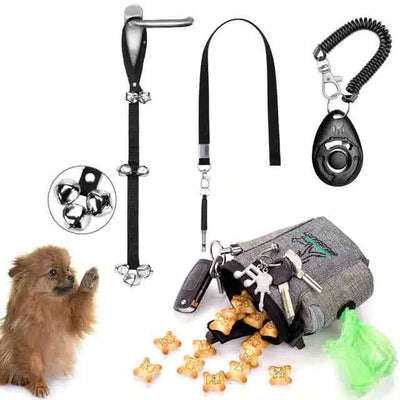Barking is a means of communication for dogs . Sometimes this barking can become annoying to the people around us and even to ourselves. There are many reasons why a dog may bark, it is very important to understand all these reasons to know when and how to act.

Is it normal for my dog to bark a lot?
As we have said before, for dogs, barking is part of their instinct and this varies depending on the breed .
For example, the German Shepherd, Miniature Schnauzer, Chihuahua or Bichon are breeds that tend to bark much more than a Saint Bernard or Great Dane. In general, guard or hunting dog breeds have a greater tendency to bark .
But... What do I do if my dog barks a lot? Next, we are going to show you different reasons and how to handle each one.
If the barking levels and frequencies are acceptable, that is, they are within the natural characteristics of our furry friend and when you tell him to stop, he listens, we are in the ideal scenario. We can say that everything is fine regarding this issue.
On the contrary, if your dog barks uncontrollably and it is difficult or practically impossible for you to get him to calm down, the following tips may help you .

Why is my dog barking?
There are breeds of dogs that have a more developed vigilance instinct than others, this is decisive for the level of barking. The breeds that are more protective bark to warn of any potential danger such as an intruder (the neighbor, the delivery man or a car that parks in front of our house).
Another case is hunting dogs, some have a deep-rooted instinct to indicate prey through barking, it is to be expected that these types of dogs will be more communicative.
Understanding this is key to knowing how to act.
If your dog is one of these examples, then you will want to let his natural instincts flow. Repressing these barks is repressing their nature . In these cases, your objective will be to moderate the intensity and frequency with training so that they are brief barks that help him vent his instinct and that in turn are tolerable for us.
Whenever our dog barks, he does so to communicate something. Here the following question arises: What do you want to tell me?
One reason may be to express the joy they feel when they see us arrive home. In this situation there is no major problem.
Another very different case can be excessive barking when crossing other dogs, people or anyone who passes in front of our house. This case is quite common and is an unwanted situation.
Excessive barking is usually fueled by fear, insecurity, frustration or boredom.

Types of dog barking:
As we have already mentioned, there are multiple reasons why a dog may bark . Below we will explain some of the most common ones.
1.- Barking due to fear or insecurity:
If your dog barks insistently every time another dog or person passes by , it is an indicator that our furry friend feels fear or insecurity. For him, that stimulus is a risk. In many cases, we foster that feeling without knowing it. When we pull or tighten the leash when we see another dog or person, we are giving warning signals. We are telling him that we are insecure or afraid, so he will look for a way to protect you and do everything possible to scare away the dog or person that is causing this sensation. In these cases, firm and safe handling is important. When we encounter the stimulus that makes him bark, we must think about what we are communicating to him and adopt a firm behavior that conveys security. Guiding him naturally and calmly will make him understand that he is not a risk and therefore it is not necessary to bark.

2.- Barking due to stress:
In this case, barking indicates that there is some basic need that is not fully covered for our dog. It could be walking, affection, feeding, playing... He uses barking as an escape route for the frustration that this causes. It is essential to know the basic needs of our companion , which vary depending on the breed. For example, a border collie demands much more physical activity than a pug. It is not something that depends on size, collies can run an average of 50 km a day while the pug must be controlled because it is common for them to have breathing difficulties and overexcitement can harm them. It is very important to inform yourself even before deciding on the breed we want. It must fit with our rhythm of life, otherwise it will be very easy to fall into this situation.

3.- Barking for protection:
There are dogs that have a greater “guardian” instinct . They tend to be very alert to their surroundings and as soon as they see a possible risk they bark to alert us of the danger. This is part of their nature and repressing this instinct can be counterproductive. The ideal in this case is to show him that you are in control of the situation. Work on strengthening a relationship of trust between the two of you. You must work as a team. He points out the “danger” to you and you show him that you will take care of protecting him. When he barks, have him back away and stay in place. Next you must act, showing that you have everything under control , identifying the “danger” and once it is identified, return to the dog calmly. This will make your dog feel valued and at the same time notice that you are in control. For example, when your dog barks out the window, make him back away and then calmly look out. Then go back to him to show him that you are in control. If we yell at him to stop barking, we are letting him understand that this stimulus also provokes you . The dog will interpret our screams as if we were barking too.

4.- Barking due to boredom:
Our dog has basic needs that have to be met every day . If your dog leads a sedentary life , has little physical activity and few mental challenges, it is very likely that he will enter a state of frustration due to all the accumulated energy . This energy will end up coming out sooner or later. Most likely he will release it through barking since that is the only thing he has to get that relief. If your dog barks at practically anything, this may be your case. The solution is to improve your quality of life by providing the physical activity you need. Mental challenges are also useful. Learn new “tricks” or play games in which you have to look for candy or toys. If this basic need is not covered, there is no point in doing training focused on barking.
5.- Barking due to loneliness:
Dogs are social animals that live in packs . Interaction with other dogs and even with people is essential for the development of our friend. If your dog spends a lot of time alone, it is normal for him to bark. These barks are their way of indicating their discomfort . If this is your case, it is best to change your habits as much as possible to share more time with your dog . Meanwhile, you can gradually train, leaving him alone at home. For this training we recommend that you leave the house for a few seconds without putting on your shoes, your coat or taking your keys, simply leave for a few seconds and come back in calmly. As if nothing had happened. You can also do your “ritual” before departure but stay at home . That is, put your shoes on and grab the keys but stay on the couch with him or continue with the activity you were doing.

6.- Barking due to socialization problems:
One of the bases for our dog's balance is teaching him to socialize . It does not mean that you should force him to interact with other dogs, as this can lead to aggressive behavior. If your dog rejects another dog, it is best to continue on our way calmly . If, on the other hand, they are receptive, it is important to give them the space, time and freedom necessary for them to present themselves and interact. If you take your dog on a leash, make sure it is loose so that it can move and feel free . Tightening the leash will make him think that you identify the other dog as a danger. Barking is a form of communication between them so it is to be expected that even when they are relating positively, there may be reasons for barking such as defining the hierarchy or wanting to play . It is very important to identify the reason for excessive barking to take prudent actions.
How to make my dog stop barking?
Regardless of the reason, all the actions we take will have results if we choose positive reinforcement over punishments. Punishments will increase our furry's stress and discomfort, moving away from the state of peace that we want to promote. Make your dog feel calm and safe at all times , inside and outside the home. For this we recommend that you pet him and use treats (such as sweets ) in different places and times. If your dog barks out of fear, do not pet him as this will make him think that this behavior is correct and you will be reinforcing it. It is also good to give him toys and share activities with him such as walks or exercising together. It is a very good way to release energy and give you happiness. When you identify a stimulus that stresses or scares him, try to distract him with candy or playing until he calms down. Never force him to interact with other dogs or people. Pay attention to the signals your dog is giving you and reassure him that you protect him. It is true that there are dogs that have internalized the behavior we want to change more than others . If this is your case, it will be very useful to go to a professional to help you identify the key factors to start correcting them.

If you have any questions about the subject, do not hesitate to contact us through our social networks or by sending us a WhatsApp . We will be happy to help you =D See you in the next post!











